17 December, 2003
One Small Step in Antarctica Equals One Giant Leap For This Florida Girl
While I always thought I knew how to walk, each new
location and Antarctic experience seemed to require a
slightly different version of this skill that is
normally taken for granted. Coming from a land of flat
surfaces and sand, learning how to walk on the icy
continent was difficult.
Hiking throughout the valleys was the first of many
challenges. Steep inclines and sometimes loose rocky
soil resulted in me slipping down the sides of
numerous mountains as my foot slid, causing a mini
avalanche. This was especially true on my very first
hike, which had me walking "sideways" across the
incline of the peek, instead of going up or down it. I
remember thinking it was going to be a long five weeks
if I continued to fall down three steps for every one
step I took. Thankfully we did not do a lot of
sideways hiking and mainly went straight up or
straight down. When hiking up, you have to make sure
your foot is planted before moving the next. Keeping
my feet stretched out in sort of a V pattern was
helpful, as was literally walking sideways.
Going down was even scarier than going up, and
unfortunately this was an area in which I improved the
least. Walking sideways, crossing one foot over
another was helpful, as was having my arms there to
help me with my balance. My team affectionately teased
me saying I looked like an orangutan with my arms
dangling.
Since the only frozen water I'd ever come across had
been floating in my coke, Antarctica provided me with
my first experience of walking across a frozen lake.
This required very small shuffles or a "clutch cargo"
step (named after the old cartoon character) in which
you place your foot very flatly on the ice.
By the time I got a handle on walking in the Valleys,
it was time to learn how to walk up snowy inclines
using crampons and take a stab at cross-country
skiing. I also learned that an ice axe makes a good
walking stick. Crevasses and snow bridges have to be
spotted in hopes that you can walk over them, and ice
that looks like it is solid doesn't always hold your
weight. The sudden surprise when your foot falls
through still caught me off guard.
Hiking around McMurdo has its challenges too. Around
town I could walk normally as long as there wasn't a
lot of ice, deep snow, or mud. Unfortunately this was
not always the case. In the beginning there was a lot
more snow around town, which continually melted and
refroze causing it to become slick and icy. As new
snow blew on top of it, you couldn't always see the
ice below it. One night on my way home from the lab my
foot slipped out from under me and I took a good
tumble. Each morning as I walked out of 155 towards
Crary I would cautiously take little baby steps as if
I were trying to sneak up on someone until I reached
the cross bridge, which usually had rockier soil on
the other side. Depending on which way I was walking
the bridge meant a sigh of relief, or a moment of
panic. Later I became more comfortable walking this
path, but I can only imagine how silly I looked those
first few weeks.
During and just after our condition 1 and condition 2
days McMurdo was covered in deep patches of snow.
Depending on the amount of snow and its texture, I
found it helpful to dig my heels in to the snow or
step right into other people's footsteps. Huge marches
are all you can do when you are walking in snow that
is nearly knee high.
Now that we are in the height of summer, McMurdo has
turned into "Muc-Mudo" as the sun has melted the snow,
causing running streams and muddy puddles. I spent my
last few weeks dodging more mud puddles than icy
patches.
While I never thought I'd be learning how to walk
again, I did get the hang of it. A few weeks ago even
Laurie was commenting as to how I'd graduated to
walking like a polar girl.
Hmmm... Now that I've got a handled on walking in
Antarctica, I wonder if I'm finally ready to own a
pair of high heels?
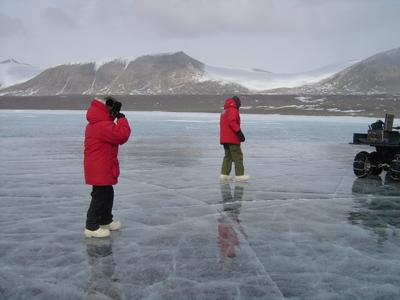
1. Dr. Rusty Rodriguez and Dr. Regina Redman demonstrate the lake ice shuffle. --
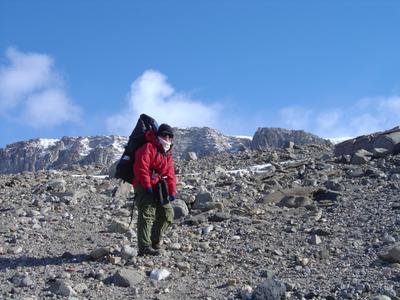
2. Me learning how to walk down hill in Taylor Valley.
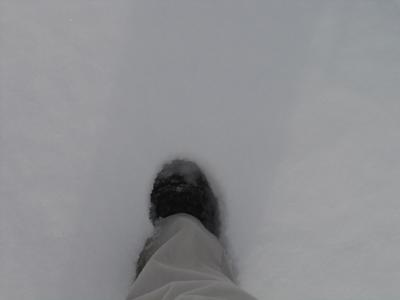
3. Ankle deep in snow just after condition 2
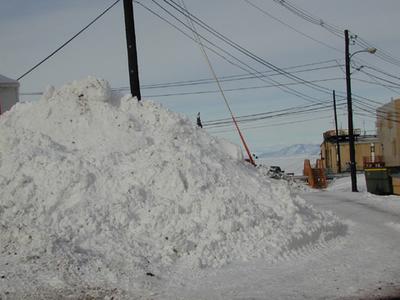
4. The view of the path to the footbridge just after condition 2. My dorm is located on the right (just off the page) and Crary is to the left of the bridge and is hidden by the snow mound. Now the path to the footbridge is free of snow and ice and is mainly a muddy mess. --
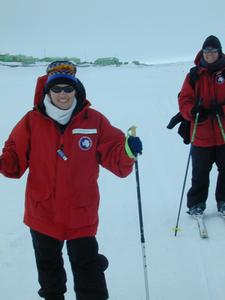
5. Learning to ski --
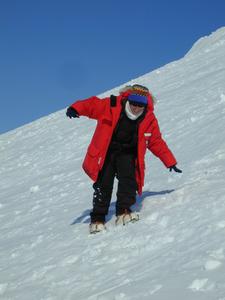
6. Learning to walk up snowy incline using crampons during snow craft II School. Still looking like a monkey... --
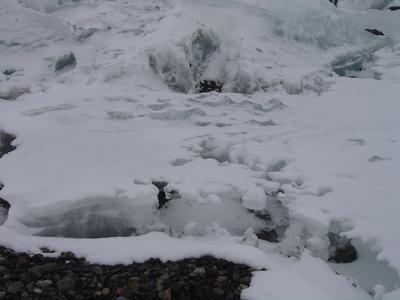
7. Our feet constantly broke through snow formations such as these. While sampling at Minna Bluffs and Black Island we had to be alert when walking over this lacy/feathery pattern. --
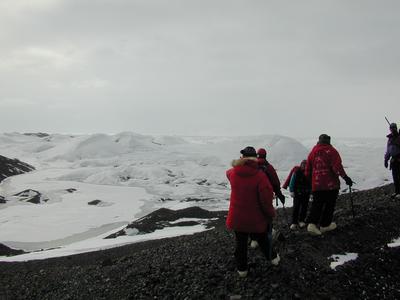
8. The team using ice axes as a walking sticks --
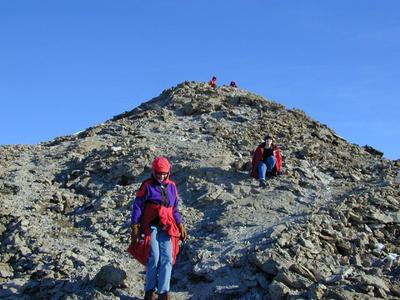
9. And when all else fails when going down hill, use your bottom! --
Contact the TEA in the field at
.
If you cannot connect through your browser, copy the
TEA's e-mail address in the "To:" line of
your favorite e-mail package.
|
